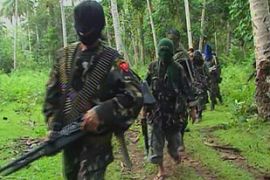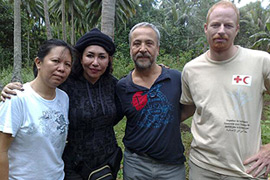Troops battle Philippine kidnappers
Tents and other equipment belonging to Abu Sayyaf hostages found on Jolo island.

There was no word about the fate of the three employees of the International Committee of the Red Cross (ICRC) – two Europeans and a Filipino – who were abducted on January 15.
Richard Gordon, the chairman of the Philippines Red Cross, told Al Jazeera he was trying to get in touch with the kidnappers.
“I just spoke just a while ago to one of their leaders who was wounded in the battle, and he says that as long as the soldiers are there, they [the kidnappers] are not going to give ground and they are not going to talk to us about this matter. We are very concerned,” he said.
He said the Red Cross would not “pay any ransom whatsoever”.
The group has not made any ransom demands, but local officials working to secure the release of the ICRC workers have quoted a figure of $1m.
Government forces had earlier tried to encircle the fighters in an attempt to locate the captives.
Abu Sayyaf is also holding captive three teachers, a nine-year-old boy and an employee of a Basilan money lending company.
Tents and equipment
Brigadier-General Gaudencio Pangilinan, a military spokesman, said Albader Parad, the Abu Sayyaf spokesman for the kidnappers, was likely killed by a marine sniper during the latest clash.
Pangilinan said troops had found tents and other equipment belonging to the three hostages near the scene of Monday’s clash.
“We recovered their tents and other equipment that we gave them,” he said.
 |
| The two Europeans and one Filipino were abducted on January 15 [Reuters] |
Pangilinan said there was no indication that Andreas Notter of Switzerland, Eugenio Vagni of Italy and Mary-Jean Lacaba of the Philippines were hurt during Monday’s clash.
Pangilinan said government forces were initially not aware that the hostages were with the fighters at the time of the clashes.
“But now we know that they are intact in one group, the Abu Sayyaf and the hostages,” he said.
“Now they have moved locations, they are being pursued. They have moved I think around two or three kilometers from the original encounter site.”
In a statement, ICRC said it was concerned that the fighting may have put the hostages in danger.
Alain Aeschlimann, ICRC’s head of operations in Asia, said his last telephone contact with the three employees was on March 11.
“[We are] aware that an exchange of gunfire took place in the region on Monday, 16 March,” he said. “We’re very concerned to hear about this development.”